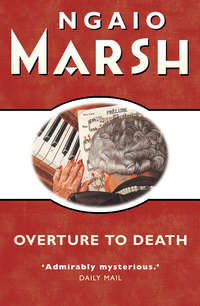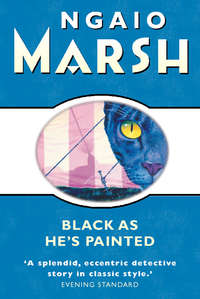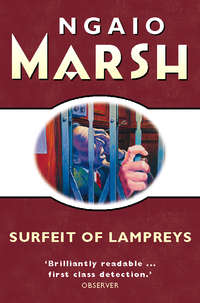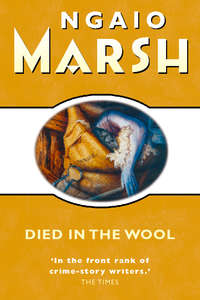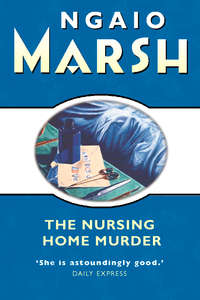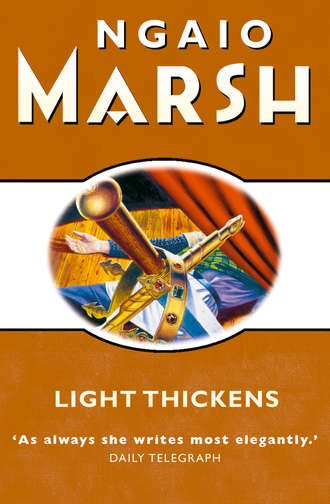
Полная версия
Light Thickens
The assistant stage manager and his assistant shifted chairs on stage for the principals and the rest sat on the stairs. Peregrine laid his notes on the prompter’s table, switched on the lamp and sat down.
He took a minute or two, reading his notes and seeing they were in order.
‘It’s awfully stuffy in here,’ said Maggie suddenly. ‘Breathless, sort of. Does anybody else think so?’
‘The weather’s changed,’ said Dougal. ‘It’s got much warmer.’
Blondie said: ‘I hope it’s not a beastly thunderstorm.’
‘Why?’
‘They give me the willies.’
‘That comes well from a witch!’
‘It’s electrical. I get pins and needles. I can’t help it.’
Ascendant thunder, startling, close, everywhere, rolled up to a sharp definitive crack. Blondie screamed.
‘Sorry!’ she said. She put her fingers in her ears. ‘I can’t help it. Truly. Sorry.’
‘Never mind, child. Come over here,’ said Maggie. She held out her hand. Blondie, answering the gesture rather than the words, ran across and crouched beside her chair.
Rangi said: ‘It’s true, she can’t help it. It affects some people like that.’
Peregrine looked up from his notes. ‘What’s up?’ he asked and then, seeing Blondie: ‘Oh. Oh, I see. Never mind, Blondie. We can’t see the lightning, can we, and the whole thing’ll be over soon. Brace up, there’s a good girl.’
‘Yes. OK.’
She straightened up. Maggie patted her shoulder. Her hand checked and then closed. She looked at the other players, made a long face, and briefly quivered her free hand at them.
‘Are you cold, Blondie?’ she asked.
‘I don’t think so. No. I’m all right. Thank you. Ah!’ she gave a little cry.
There was another roll of thunder; not so close, less precipitant.
‘It’s moving away,’ said Maggie.
It died out in an indeterminate series of three or four thuds and bumps. Then, without warning, the sky opened and the rain crashed down.
‘Overture and Beginners, please,’ Dougal quoted and got his laugh.
By the time, about an hour later, Peregrine had finished his notes and recapped the faulty passages, the rain had stopped almost as abruptly as it began and the actors left the theatre on a calm night with stars shining: brilliant, above the rain-washed air. London glittered. A sense of urgency and excitement was abroad and when Peregrine whistled the opening phrase of a Brandenburg Concerto it might have been a whole orchestra giving it out.
‘Come back to my flat for an hour, Maggie,’ said Dougal. ‘It’s too lovely a night to go home on.’
‘No, thank you, Dougal. I’m tired and hungry and I’ve ordered a car and here it is. Good night.’
Peregrine saw them all go their ways. Still whistling, he walked downhill and only then noticed that a little derelict shed on the waterfront lay in a heap of rubble.
I hadn’t realized it had been demolished, he thought.
Next morning, a workman operating a scoop-lift pointed to a black scar on one of the stones.
‘See that,’ he said cheerfully to Peregrine. ‘That’s the mark of the Devil’s thumb, that is. You don’t often see it. Not nowadays you don’t.’
‘The Devil’s thumb?’
‘That’s right, Squire. Lightning.’
II
Simon Morten had taken the part of Macduff by storm. His dark good looks and dashing, easy mockery of the porter on his first entrance with Lennox, his assertion of his hereditary right to wake his king, his cheerful run up the stairs whistling as he went into the bloodied chamber while Lennox warmed himself at the fire and talked cosily about the wild intemperance of the night, all gave him an easy ascendancy.
Macbeth listened, but not to him.
The door opened. Macduff stumbled on stage, incoherent, ashen-faced, the former man wiped out as if by the sweep of the murderer’s hand. The stirred-up havoc, the alarum bell, the place alive suddenly with the horror of assassination. The courtyard filled with men roused from their sleep, nightgowns hastily pulled on, wild and dishevelled. The bell jangling madly.
The scene ends with the flight of the King’s sons. Thereafter, in a short final scene, Macduff, already suspicious, decides not to attend Macbeth’s coronation but to retire to his own headquarters at Fife. It is here that he will make his fatal decision to turn south to England, where he will learn of the murder of his wife and children. From then on he will be a man with a single object: to return to Scotland, find Macbeth and kill him.
Once Banquo has been murdered, Macduff moves forward and the end is now inevitable.
Morten had now become enamoured of the fight, which he continued to rehearse with Dougal. At Gaston’s suggestion they both began to exercise vigorously, apart from the actual combat, and became expert in the handling of their weapons, twirling and slashing with alarming dexterity. The steel replicas were ready and they used them.
Peregrine came down to the theatre early one morning for a discussion on costumes and found them hard at it. Blue sparks flew, the claymores whistled. The actors leapt nimbly from spot to spot. Occasionally they grunted. Their shields were tightly strapped to their left forearms, leaving the hand free for the double-handed weapon. Peregrine gazed upon them with considerable alarm.
‘Nimble, aren’t they?’ asked Gaston, looming up behind him.
‘Very,’ Peregrine agreed nervously. ‘I haven’t seen them for a fortnight or more. I – I suppose they are safe. By and large. Safe,’ he repeated on a shriller note, as Macduff executed a downward sweep which Macbeth deflected and dodged by the narrowest of margins.
‘Absolutely,’ Gaston promised. ‘I stake my reputation upon it. Ah. Excuse me. Very well, gentlemen, call it a morning. Thank you. Don’t go, Mr Jay. Your remark about safety has reminded me. There will, of course, be no change in the size and position of the rostra? They are precisely where they will be for the performance?’
‘Yes.’
‘Good. To the fraction of an inch, I hope? Their footwork has been rehearsed with the greatest care, you know. Like a dance. Let me show you.’
He produced a plan of the stage. It was extremely elaborate and was broken up into innumerable squares.
‘The stage is marked – I dare say you have noticed – in exactly the same way. Let me say I am asking the Macduff to deliver a downward sweep from right to left and the Macbeth is to parry it and leap to the lower level. I shall say – ‘ and here he raised his voice and shrieked: ‘Mac-d. Right foot at 13b. Raise claidheamh-mor – move to 90 degrees. Sweep to 12. Er-one. Er-two. Er-three. Meanwhile…’
He continued in this baffling manner for some seconds and then resumed in his normal bass: ‘So you will understand, Mr Jay, that the least inaccuracy in the squares might well lead to – shall we say? – to the bisection of the opponent’s foot. No. I exaggerate. The crushing would be more appropriate. And we would not want that to happen, would we?’
‘Certainly not. But my dear Gaston, please don’t misunderstand me. I think the plan is most ingenious and the result – er – breathtaking, but would it not be just as effective, for instance – ‘
He got no further. He saw the crimson flush rise in Gaston’s face.
‘Are you about to suggest that we employ a “fake”?’ Gaston demanded, and before Peregrine could reply said: ‘In which case I leave this theatre. For good. Taking with me the weapons and writing to The Times to point out the ludicrous aspects of the charade that will inevitably be foisted upon the audience. Well? Yes or no?’
‘Yes. No. I don’t know which I mean but I implore you not to go waltzing out on us, Gaston. You tell me it’s safe and I accept your authority. I’ll get the insurance people to cover us,’ he added hurriedly. ‘You’ve no objection to that, I hope?’
Gaston waved his hand grandly and ambiguously. He went up on stage and collected the weapons which the users had put into felt containers.
‘I wish you good morning,’ he said. And, as an afterthought: ‘I will take charge of the claidheamh-mors, and will return them tomorrow. Again, good morning.’
‘Good morning, Gaston,’ Peregrine said thankfully.
III
Peregrine had to admit, strictly to himself, that a change had come over the atmosphere in the theatre. It was not that rehearsals went badly. They went, on the whole, very well, with no more than the expected clashes of temperament among the actors. Barrabell, the Banquo, was the most prominent where these were concerned. He had only to appear on stage for an argument to begin about the various movements of the actors. But Peregrine was, for the most part, a patient and sagacious director and he never let loose a formidable display of anger without considering that the time had come for it and the result would be salutary. He had never encountered Barrabell before but it didn’t take him long to suspect a troublemaker and this morning he had confirmation of it. Barrabell and Nina Gaythorne arrived together. He had dropped his beautifully controlled voice to its lowest level, he had taken her arm, and in her faded, good-natured face there appeared an expression that reminded Peregrine of a schoolchild receiving naughty but absorbing information upon a forbidden subject.
‘Most unexpected,’ the Voice confided. ‘I wasn’t here, of course, but I happened to look out…’ It sank below the point of audibility. ‘…concentrated…most extraordinary…’
‘Really?’
‘…Blondie…rigor…’
‘No!’
‘I promise.’
At this point they came through the scenic archway and saw Peregrine. There was a very awkward silence.
‘Good morning,’ said Peregrine happily.
‘Good morning, Perry. Er – good morning. Er.’
‘You were talking about last night’s storm.’
‘Ah. Yes. Yes, we were. I was saying it was a heavy one.’
‘Yes? But you were not here.’
‘No. I saw it from a window. In Westminster: well, Pimlico.’
‘I didn’t see it,’ said Nina. ‘Not really.’
‘Did you notice that old shed on the waterfront has collapsed?’ Peregrine asked.
‘Ah!’ said Barrabell on a full note. ‘That’s what it is! The difference!’
‘It was struck by lightning.’
‘Fancy!’
‘The centre of the storm.’
‘Not the theatre.’
‘No,’ they both fervently agreed. ‘Not our theatre.’
‘Did you hear about Blondie?’
They made noises.
‘She was here,’ said Peregrine. ‘So was I. Blondie has this thing about lightning. Electricity in the air. My mother has it. She’s seventy and very perky.’
‘Oh yes?’ said Nina. ‘How lovely.’
‘Very fit and well but gets electrically disturbed during thunder-storms.’
‘I see,’ said Barrabell.
‘It’s quite a common occurrence. Like cat’s fur crackling. Nina darling,’ said Peregrine, putting his arm around her, ‘I’ve got three little boys coming this morning to audition for the Macduff kid. Would you be an angel and go through the scene with them? Here are their photographs. Look.’
He opened a copy of Spotlight at the child-actors’ section. Three infant phenomena were displayed. Two were embarrassingly overdressed and bore an innocent look that only just failed to conceal an awful complacency. The third had sensible clothes and a cheeky face.
‘He’s got something,’ said Nina. ‘I would feel I could bear to cuddle him. When was the photo taken, I wonder.’
‘Who can tell? He’s called William Smith, which attracts one. The others, as you’ll see, are called Wayne and Cedric.’
‘Little horrors.’
‘Probably. But one never knows.’
‘We’ll have to see, won’t we?’ said Nina, who had recovered her poise and was determined not to get involved with Barrabell-Banquo again.
A girl from the manager’s office came through to say the juveniles had arrived, each with its parent.
‘I’ll see them one by one in the rehearsal room. Nina, would you come, dear?’
‘Yes, of course.’
They went together.
For a little while Barrabell was alone. He had offered his services as the obligatory Equity Representative for this production. It is not a job that most actors like very much. It’s not pleasant to tell a fellow player that his subscription is overdue or to appeal against an infringement, imagined or genuine, by the management, though the Dolphin in its integrity and strong ‘family’ reputation was not likely to run into trouble of that sort.
Barrabell belonged to a small, extreme leftist group called The Red Fellowship. Nobody seemed to know what it wanted except that it didn’t want anything that was established or that made money in the theatre. Dougal Macdougal was equally far on the right and wanted, or so it was believed, to bring a Jacobite pretender to the throne and restore capital punishment.
Barrabell kept his ideas to himself. Peregrine was vaguely aware of his extreme leftist views but being himself hopelessly uncommitted to anything other than the theatre, gave it no more consideration than that.
The rest of the cast were equally vague.
So when the business of appointing a representative came up and Barrabell said he’d done it before and if they liked he’d do it again, they were glad to let him be their Eq. Rep. Equity is an apolitical body and takes in all shades of opinion.
But if they were indifferent to him, he was far from being indifferent to them. He had a cast list with little signs against quite a number of names. As rehearsals went on he hoped to add to it. Dougal Macdougal’s name was boxed in. Barrabell looked at it for some time with his head on one side. He then put a question mark beside it.
The rest of the cast for the morning’s rehearsal arrived. Peregrine and Nina returned with a fresh-faced child in tow.
‘Quickest piece of casting in our records,’ said Peregrine. ‘This is William Smith, everybody. Young Macduff to you.’
The little boy’s face broke into a delightful smile. Delighted and delightful. It was transformed.
‘Hal-lo, William,’ said Dougal.
‘Hallo, sir,’ said William. Not a vowel wrong and nothing forced.
‘His mama is coming back for him in an hour,’ said Peregrine. ‘Sit over there, William, and watch rehearsal.’
He sat by Nina.
‘This morning we’re breaking new ground,’ said Peregrine. ‘Banquet scene with ghost of Banquo. I’ll explain the business with the ghost. You, Banquo, will wear a mask. A ghastly mask. Open mouth with blood running. You’ll have time to change your clothes. You will have doubles. The table will have a completely convincing false side with heavily carved legs and the black space painted between them. You and your double will be hidden behind this side. Your stool is at the head of the table.
‘Now. The Macbeths’ costumes. The Lady has voluminous sleeves, attached all the way down to her costume. When she says “Meeting were bare without it,” she holds out her hands. She is standing in front of the stool and masks it. Macbeth goes up to her and on his own “Sweet remembrancer” takes and kisses her hands. They form, momentarily, a complete mask to the stool. Banquo, from under the table, slides up on to the stool. The speed with which you do this is all-important. Banquo, you sit on the stool with your back to Macbeth and your head bent down. The Macbeths move off to his right.
‘On Macbeth’s “Where?” Banquo turns. Recognition. Climax. He’s a proper job. Bloody hair, throat cut, chest stabbed, blood all over it. On “Feed and regard him not” the thanes obey the Lady but rather self-consciously. They eat and mumble. Keep it quiet. Macbeth shrinks back and to the right. She follows.
‘On Macbeth’s “What care I,” Banquo lets his head go back and then fall forward. He rises and exits left. This is going to take a lot of work. You thanes, all of you, can not see him. Repeat: you can not see him. He almost touches you but for you he is not there. You all watch Macbeth. Have you all got that? Stop me if I’m going too fast.’
‘Just a moment,’ said Banquo.
Here we go, thought Peregrine. ‘Yes, Bruce?’ he said.
‘How much room will there be under this thick-table affair?’
‘Plenty, I hope.’
‘And how do I see?’
Peregrine stopped himself saying ‘With your eyes.’ ‘The mask,’ he explained, ‘is being very carefully designed. It is attached to the headpiece. The eye-holes are big. Your own eyes will be painted out. Gaston has done an excellent drawing for us. They will take a mould of your face.’
‘Oh my God.’
‘A bloodied cloak will be firmly fixed to the neck and ripped up in several places.’
‘I’ll want to see all these things, Perry. I’ll want to rehearse in them.’
‘So you shall. Till the cows come home.’
‘Thank you very much,’ said the beautiful voice silkily.
‘Any more questions? No? Well, let’s try it.’
They tried it slowly and then faster. Many times.
‘I think it’ll work,’ Peregrine said at last to Nina who was sitting behind him.
‘Oh yes, Perry. Yes. Yes.’
‘We’ll move on to the next “appearance”. Dougal, you have this distraught, confused, self-betraying speech. You pull yourself together and propose a health. You stand in front of the stool, masking it, holding out the cup in your left hand. Ross fills it. The understudy is in position. Under the table. Is he here? Yes, Toby. You’ve moved up to the end. You can see when Macbeth’s arm and hand, holding the goblet, are in place and you slip up on the stool. Macbeth proposes the toast. He moves away, facing front. He does what we all hope he will not do: he names Banquo. The thanes drink. He turns to go upstage and there is the Ghost. On “unreal mockery, hence” the Ghost rises. He moves to the stairs, passing between Menteith and Gaston and past the soldiers on guard, up into the murder chamber. Everyone watches Macbeth who raves on. Now, inch by inch, we’ll walk it.’
They did so, marking what they did in their scripts, gradually working through the whole scene, taking notes, walking the moves, fitting the pieces together. Peregrine said: ‘If ever there was a scene that could be ruined by a bit-part actor, this is it. It’s all very well to say you must completely ignore the Ghost, that for you it’s not there; but it calls for a damn good actor to achieve it. We’ve got to make the audience accept the reality of the Ghost and be frightened by it. The most intelligent of you all, Lennox, has the line: “Good night, and better health attend His Majesty.” When next we see Lennox he’s speaking of his suspicions to Ross. The actor will, ever so slightly, not a fraction too much, make us aware of this. A hair’s-breadth pause after he says good night, perhaps. You’ve got your moves. Take them once more to make sure and go away and think through the whole scene, step by step, and then decide absolutely what you are feeling and doing at every moment.’
When they had gone Peregrine took Macbeth’s scene with the murderers. Then the actual murder of Banquo.
‘Listen!’ Peregrine said. ‘Just listen to the gift this golden hand offers you. It’s got everything. The last glint of sunset, the near approach of disaster.
“The West yet glimmers with some streaks of day.
Now spurs the lated traveller apace
To gain the timely inn.”
‘And now we hear the thud of horses’ hooves. Louder and louder. They stop. A pause. Then the horses go away. Enter Banquo with a lanthorn. I do want a profoundly deep voice for this speech. I’m sorry,’ he said to the First Murderer. ‘I’m going to give it to Gaston. It’s a matter of voice, dear boy, not of talent. Believe me, it’s a matter of voice.’
‘Yes. All right,’ said the stricken murderer.
They read the scene.
‘That’s exactly what I want. You will see that Seyton is present in both these scenes and indeed is never far from Macbeth’s business from this time on. We are very lucky to have Mr Sears to take the part. He is the sword-bearer. He looms over the play and so does his tremendous weapon.’
‘It is,’ Gaston boomingly explained, ‘the symbol of coming death. Its shadow grows more menacing as the play draws inexorably towards its close. I am reminded – ‘
‘Exactly,’ Peregrine interrupted. ‘The play grows darker. Always darker. The relief is in the English scene. And now – ‘ He hurried on, while Gaston also continued in his pronouncements of doom. For a short time they spoke together and then Gaston, having attained his indistinguishable climax, stopped as suddenly as a turned-off tap, said ‘Good morning’ and left the theatre.
Peregrine opened his arms and let them flop. ‘One puts up with the unbelievable,’ he said. ‘He’s an actor. He’s a paid-up member of Equity. He spoke that little speech in a way that sent quivers up and down my spine and he’s got Sir Dougal Macdougal and Simon Morten banging away at each other with a zeal that makes you sweat. I suppose I’m meant to put up with other bits of eccentricity as they occur.’
‘Is he certifiable?’ asked Maggie.
‘Probably.’
‘I wouldn’t put up with it,’ said Bruce Barrabell. ‘Get him back.’
‘What do I say when he comes? He’s perfect for the part. Perfect.’
Nina said: ‘Just a quiet word in private? Ask him not to?’
‘Not to what?’
‘Go on talking while you are talking?’ she said doubtfully.
‘He hasn’t done it since the first day until now. I’ll leave it for this time.’
‘Of course, if one’s afraid of him…’ sneered Barrabell, and was heard.
‘I am afraid. I’m afraid he’ll walk out and I don’t mind admitting it. He’s irreplaceable,’ said Peregrine.
‘I agree with you, dear boy,’ said Sir Dougal.
‘So do I,’ said Maggie. ‘He’s too valuable.’
‘So be it,’ said Peregrine. ‘Now, William, let’s see how you shape up. Come on, Nina. And Lennox. And the murderers.’
They shaped up well. William was quick and unobjectionable. The young Macduff was cheeky and he showed spirit and breeding. His mama returned, a quietly dressed woman from whom he had inherited his vowels. They completed the financial arrangements and left. Nina, delighted with him, also left. Peregrine said to Dougal and Maggie: ‘And now, my dears, the rest of the day is ours. Let’s consolidate.’
Конец ознакомительного фрагмента.
Текст предоставлен ООО «ЛитРес».
Прочитайте эту книгу целиком, купив полную легальную версию на ЛитРес.
Безопасно оплатить книгу можно банковской картой Visa, MasterCard, Maestro, со счета мобильного телефона, с платежного терминала, в салоне МТС или Связной, через PayPal, WebMoney, Яндекс.Деньги, QIWI Кошелек, бонусными картами или другим удобным Вам способом.


